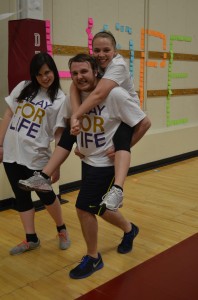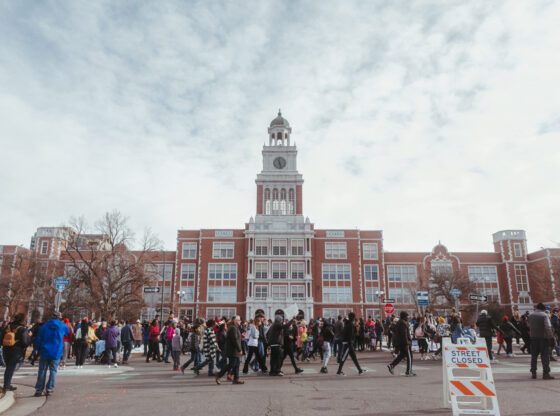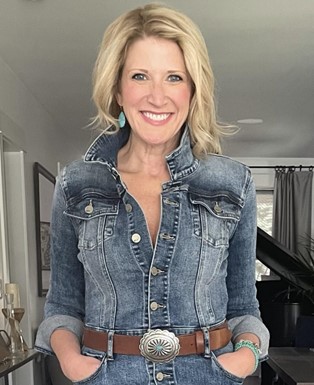
Glowing paper lanterns called luminarias lined the perimeter of Gates Field House on Friday night as students walked in support of the American Cancer Society’s Relay For Life.
Relay For Life took place from 7 p.m. on Friday until early Saturday morning. Students in DU’s Colleges Against Cancer club have been planning the annual event since January in order to raise funds for cancer research. The participation fee was $10 per person and all proceeds went to American Cancer Society.
Many of the donations were achieved through students appealing to friends, families and businesses to enlist their support in the fight against cancer.
Participants registered online before the event at DURelay.com. Students from a variety of organizations on campus formed teams. Organizations such as Up Til Dawn, Alpha Phi, Delta Zeta and others formed teams. Approximately 150 students attended, with teams usually made up of six or seven members.
At most Relay For Life events, participants are encouraged to walk the track all night or take turns walking with other relayers. Organizers of Friday’s relay, however, decided to ask participants to try to walk the track 100 times in honor of the American Cancer Society’s 100th anniversary.
The event began with speeches by two cancer survivors who told their stories.
The second speaker, Woody Roseland, used humor to communicate the story of his unrelenting battle with bone cancer as well as the amputation of his left leg as a result of the disease.
“I’ve had cancer seven times which, last time I checked, is way too many times,” he said.
Roseland thanked students for dedicating themselves to a worthwhile cause and challenged them to do more.
“There are too many luminarias here, too many people that are battling this,” he said.
After the speeches, the luminaria ceremony began. This ceremony is held at every Relay For Life event. Participants write on luminaria bags in remembrance or encouragement of those who have been affected by cancer.
The lights were turned off and candlelit luminarias formed the boundary of the walking path around the room. A slideshow listed reasons participants were walking, and each participant stood up and began walking as their reason for relaying was shown.
This ceremony was followed by a commemoration. Bouncy castles were situated in the center of the track and free food was offered, donated by vendors including Jimmy Johns and Red Bull.
The DU Grilling Society also supplied grilled options. DJ Ray, who often works with the American Cancer Society, provided music for the event that ranged from touching acoustic numbers to more upbeat pop tunes to help keep walkers motivated.
Students laughed and chatted, but the atmosphere of the entire event was permeated by an awareness of the serious motive behind it.
Colleges Against Cancer was established at DU in 2005 specifically to organize Relay for Life. Although they plan other events such as Burritos for Boobs and participate in Breast Cancer Awareness Week, planning Relay For Life is the main focus of the organization.
Leslee Warren, a junior molecular biology major from Highlands Ranch and president of Colleges Against Cancer, expressed hope for the growth of the event.
“Cancer has always been a part of my life. Cancer affects everyone in some way,” she said.
According to Warren, as of the beginning of the event on Friday the organization had already raised $12,000 in donations.
According to their website, The American Cancer Society was founded in 1913 to help increase cancer awareness. It is the second highest donor to cancer research below the United States government.
Relay For Life began in the mid-1980s to celebrate the lives of people who have battled cancer, remember those who lost their lives as a result of cancer and fight back against the disease by funding research towards a cure.
Kayla Stoick, a junior biology major originally from Portland, Ore, expressed her personal connection to the event.
“My grandma had bone cancer for eight years and she died my freshman year. That’s when I decided I wanted to get involved with [Relay For Life],” she said.
Each of the relayers had a personal connection to cancer and a story to tell.
Relay For Life will continue as a tradition at DU, and according to Leslee Warren, Colleges Against Cancer hopes to progressively expand the event and host it outdoors next year.











